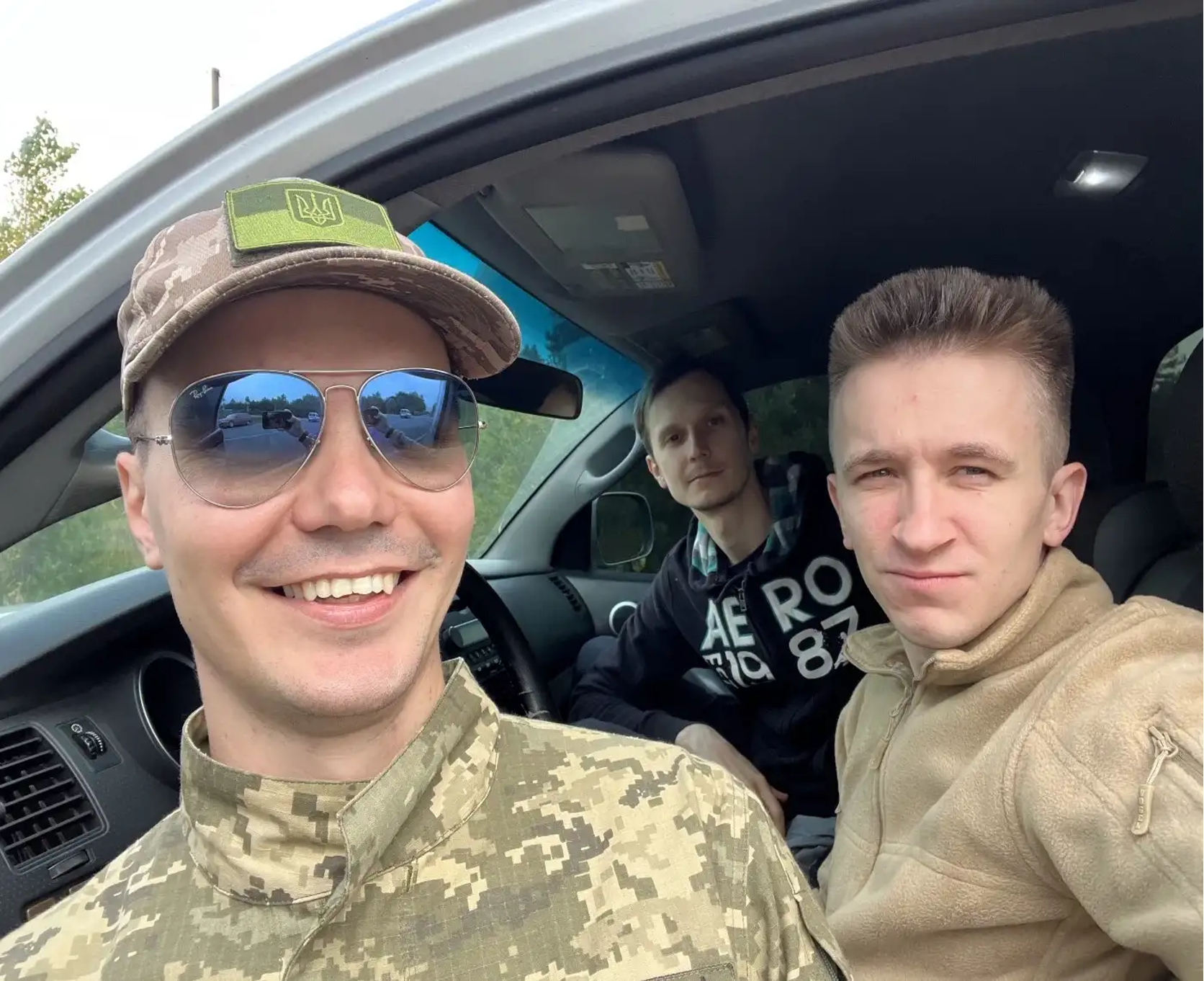Thirty-five-year-old Viktor Cherniivaskyi is no stranger to pain. In August 2014, he was helping citizens escape a militarized zone, the product of mass Ukrainian protests, the ousting of Ukraine’s president, and the Russian annexation of Crimea. Russian soldiers captured Viktor, hooked up wires to his feet and ran currents through his body, torturing him with electricity and baseball bats for over an hour in the basement of a makeshift Russian prisoner camp in Lugansk. It’s hard not to be skeptical when he tells me that he’s had no physical or mental scars from the experience, but Cherniivaskyi’s optimism is remarkably convincing. Over the course of our half-hour Zoom interview, days since returning from the front lines in Bakhmut, Viktor described praying daily with his cellmate all those years ago, even as food remained scarce and the beatings continued for captured Ukrainians.
Amazingly, Cherniivaskyi was released in late 2014 and took his wife and young son to the western part of Ukraine. The conflict, however, was far from over, and Viktor’s mission was far from completed. Although the men who tortured Viktor were soldiers, Cherniivaskyi isn’t one. He’s actually a leader in one of Kyiv’s largest Protestant churches: Salvation, where he’s served in a deacon-like role for the past seven years. In early 2022, he was the leader of Salvation Church’s foreign ministries program, mostly working with Christians from African nations. And then the morning of February 24, 2022, dawned, and Cherniivaskyi’s world was turned upside down again.
“I was in bed,” he tells me, describing how he began reading the shocking morning news that Putin’s forces had breachedthe Ukrainian border and that explosions were going off from Kharkiv to Mariupol. Although Viktor says he heard no explosions, he’d anticipated such a situation for weeks. Grabbing their already-packed bags, the Cherniivaskyi family left Kyiv for a safer region of the country.
During the first month of war, Viktor was running ragged. Fourteen-hour workdays were taking their toll, and his health quickly declined. “We were helping with refugees,” he explains, along with “providing military assistance where it’s needed.” On the domestic front, Salvation Church was there to help families rent apartments as Cherniivaskyi continued humanitarian work in the region. All hands were on deck as Ukrainian cities descended into varying states of madness. “In Kyiv in March, it was the Wild West,” Viktor remarked. “There are no rules on the road.” As the days rolled into April, his health gradually improved, allowing him more time to continue his peacetime job as a software programmer and build support for Ukraine on social media platforms like Telegram, even as he kept up humanitarian missions when possible.
During the summer of 2022 in Kyiv, Viktor explained to me how being in a military operation in Kyiv made life immeasurably easier. “If you are in uniform, you won’t wait for fuel,” he noted. “Everyone lets you go.” Many civilians waited in hours-long lines as half of Ukraine’s gas stations were forced to close. This fuel took Viktor across the country in everything from Sprinter vans to pickup trucks—he’s been to almost every major population center to evacuate hundreds of civilians.
Cherniivaskyi’s chaplain duties also bring him into daily contact with Ukrainian soldiers. Many have left friends and families behind to fight for the future of their country, and chaplains like Viktor bring far more than just medical supplies and military equipment. “We share the community of Christ and often pray with them.” To Cherniivaskyi, who grew up with alcoholic parents and found Christ at 11, he sees this mission as absolutely vital. “Of course [we do], why not? It’s God’s miracle in my life.” When I asked Viktor how open soldiers are to hearing the Gospel, he admits that it’s a mixed bag: “It depends on the regiment … there’ll be one resident.”
I also asked Viktor whether he considers the war in Ukraine an outgrowth of spiritual warfare, and received a wholehearted yes. “It’s good things versus evil things. These people in Russia [soldiers], their priests bless them to kill children. We don’t even think about them as priests.” Cherniivaskyi remembers each missile strike and military loss, even telling me about the day he found out about the death of American journalist Brent Renaud. “They [Russian soldiers] don’t feel guilty,” Viktor maintains. “They know what they’re doing.” However, he also praises the Russians who’ve left Putin’s army to fight for Ukraine, including the Freedom of Russia legion within Ukraine’s army that Cherniivaskyi’s units fight alongside. “They’re great,” Viktor tells me.
After more than 300 days at war, Viktor still has an optimistic outlook on the fate of his country. “We [military] see a lot of the results that propaganda covers up,” he says, even noting that defeating Russia wouldn’t be possible without the support of Western nations like America. “They [Russians] have bigger artillery, but we are the winning side. The Western world is listening to us.” He even tells me about his young son as an example of how he sees light at the end of the dark war tunnel. “When I became a dad, I became an optimist. My son is trying to follow my example… my world is far better [because of] my family and children.”
Lastly, Viktor told me about how his church community reminds him what he’s truly fighting for. When I called, he’d just returned from the devastation of Bakhmut’s streets to a packed worship service at Salvation Church, reportedly home to more than 5,000 Christians. This contrast, Cherniivaskyi says, represents the reason he’s been fighting and ministering for all these years. “You see happy faces, warm food, electricity, and a normal life. In Bakhmut, they have none of these things,” he remarks as our interview comes to a close.
“I know that what is happening in Bakhmut is the price our soldiers pay for that life.”
